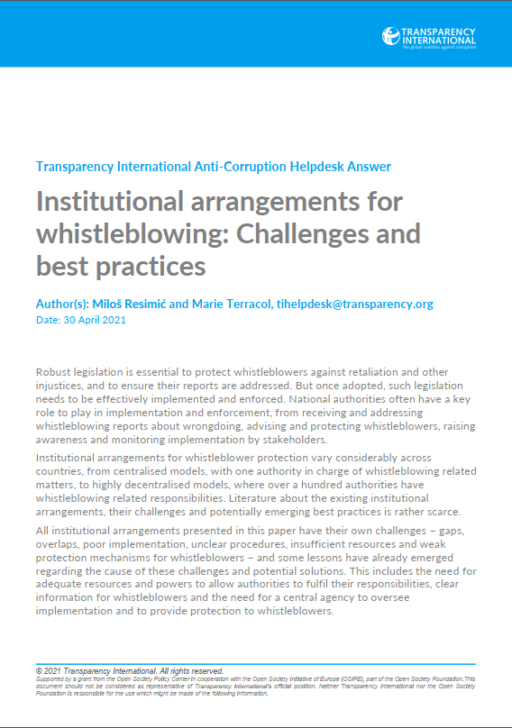- Home
- Anti-Corruption Helpdesk
- Institutional arrangements for whistleblowing: Challenges and best practices
Institutional arrangements for whistleblowing: Challenges and best practices

This Anti-Corruption Helpdesk brief was produced in response to a query from one of Transparency International’s national chapters. The Anti-Corruption Helpdesk is operated by Transparency International and funded by the European Union.
Query
What institutional arrangements ensure effective implementation and enforcement of whistleblowing legislation? What are the challenges and lessons learned?
Summary
Robust legislation is essential to protect whistleblowers against retaliation and other injustices, and to ensure their reports are addressed. But once adopted, such legislation needs to be effectively implemented and enforced. National authorities often have a key role to play in implementation and enforcement, from receiving and addressing whistleblowing reports about wrongdoing, advising and protecting whistleblowers, raising awareness and monitoring implementation by stakeholders.
Institutional arrangements for whistleblower protection vary considerably across countries, from centralised models, with one authority in charge of whistleblowing related matters, to highly decentralised models, where over a hundred authorities have whistleblowing related responsibilities. Literature about the existing institutional arrangements, their challenges and potentially emerging best practices is rather scarce.
All institutional arrangements presented in this paper have their own challenges – gaps, overlaps, poor implementation, unclear procedures, insufficient resources and weak protection mechanisms for whistleblowers – and some lessons have already emerged regarding the cause of these challenges and potential solutions. This includes the need for adequate resources and powers to allow authorities to fulfil their responsibilities, clear information for whistleblowers and the need for a central agency to oversee implementation and to provide protection to whistleblowers.
Contents
- Introduction
- Overview of possible institutional arrangements
- Examples of institutional arrangements
- Challenges and lessons learned
- Conclusion
Main points
- There are many possible institutional arrangements for whistleblowing, from rather centralised models, where one authority plays a key role, to decentralised models, without an authority responsible for whistleblowing.
- A specialised authority can be established, or whistleblowing roles and responsibilities can be given to one or several authorities.
- Main challenges: lack of resource and capacity to fulfil tasks; weak monitoring and oversight of competent authorities; expectation gap with regard to whistleblowing authorities’ responsibilities and powers; inadequate protection for whistleblowers; a general lack of legal, financial and psychological support.
- Lessons: adequate resources and powers is key; clear information and guidance for whistleblowers; need a central agency for oversight of implementation and to provide protection to whistleblowers.
This paper was supported by a grant from the Open Society Policy Center in cooperation with the Open Society Initiative of Europe (OSIFE), part of the Open Society Foundation.
Authors
Miloš Resimić and Marie Terracol, [email protected]
Date
17/05/2021
 Download PDF
Download PDF
